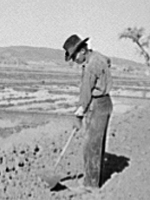
Stutts, Rosemary AlvarezAboutInterview conducted to obtain a first-person account of the use of horses in farming for the exhibit "Traditions" (1998). Includes other details of Stutts growing up on her family farm near Salem, N.M. Tape Two is her memories of Italian and German prisoners of war working on the family farm during World War II.
Abstract
Tape 1, Side A
Rosemary Alvarez Stutts states that her father's name is Isidro Alvarez, born on May 14, 1894. Her mother, Emelia Morales Alvarez, was born April 27, 1903. The pair was married November 6, 1920. Her father was born La Mesilla, near the place of her father's birth is now a street marker for Calle de Alvarez, across from the old riverbed. She was reared on a farm near Salem. At that time her father raised hay, perhaps chile. Hay is a significant crop in New Mexico, she tells the interviewer. Her father also grew watermelons, cantaloupes, and tomatoes. Ms. Stutts remembers the farmily's transition from workhorses to tractors and gasoline-driven engines as being in the mid-1940s. Mr. Alvarez' saddle and workhorses were named El Tonto and El Chango. They grazed on the sides of the irrigation ditch. She recalls her father harnessing the workhorses. After use, the harnesses were hung up to straighten them and to allow the perspiration to dry. New harnesses were purchased from Porter's Center in Hatch, a grocery, hardware, feed, and general store. Her father bought his first tractor from International Harvester Company. It was an investment. Her father also wanted to buy more land and eventually purchased a portion of the Luis Freudenthal farm. They would pick berries, possibly algerita berries, from there and make Kool- Aid. After her father had his tractor, he still used workhorses on some parts of the farm. The first three tractors were Farmalls. Jane O'Cain states that the Farmall H model was manufactured in 1941; Ms. Stutts thinks her father bought that model in the spring of 1942. He later bought an "M" model. In the late 1960s Stutts' father bought a tractor to cultivate lettuce, a light Farmall tractor. Mr. Alvarez kept all his tractors; everything was intact at the farm. Ms. Stutts says that her father gained efficiency in farming when he changed from horses to tractors, and it took less physical strength.
Tape 1, Side B
This side of the tape is blank.
Tape 2, Side A
The consultant's parents owned an irrigated farm near Salem, N. M. where they raised alfalfa and some small grains. After the start of World War II, the Alvarez family lost their traditional labor, men from the neighborhood. Rosemary recalls that the women from these families did assist with the harvest for a period of time. She does not recall hearing talk in school or at home about plans to locate a prisoner of war (hereafter POW) camp in Hatch. She remembers the German POWs working for her father, more so than the Italian POWs. The consultant discusses that she went to the POW camp with her father when he went to arrange for labor. Her father would drive to Hatch in his small truck and pick up twenty-five prisoners and their guard. She remembers the POWs as being happy. The POWs presented her with three or four oranges one morning upon their arrival at the farm. The consultant discussed the German prisoners of war with a man who had served in the military during WWII. He thinks the German soldiers were "atrocious," a very different assessment than that made by the consultant.
Tape 2, Side B
The consultant believes that the U.S. government made the right decision in allowing the POWs to work in agriculture. She discusses some of the rationing that occurred during the war years. Her father would give extra ration coupons to others more in need than his family. |

